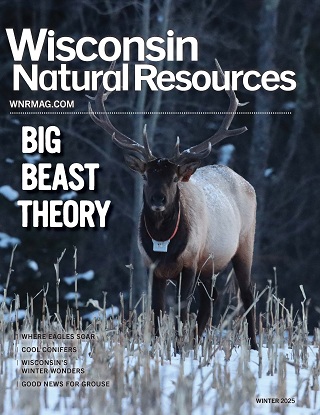A message from the Secretary
Preston D. Cole
 © MIKE GORSKI
© MIKE GORSKIThis year marks the 50th anniversary of Earth Day — a milestone certainly worth celebrating.
In 1970, a gallon of gas was 36 cents, the U.S. lowered the voting age to 18 and “ABC” by The Jackson 5 was the No. 1 song, with “Raindrops Keep Falling on My Head” by B.J. Thomas not far behind.
That same year, the U.S. Environmental Protection Agency was created. And, of course, that was also the year of the very first Earth Day, founded by Wisconsin’s own Gaylord Nelson, who was the state’s 35th governor and three-term U.S. senator.
His daughter and environmentalist, Tia Nelson, has followed in his footsteps. You can read more about her work in the magazine’s cover story.
Up until the 1970s, protecting the planet’s natural resources was not a national priority. Factories pumped pollutants into the air, lakes and rivers with few repercussions. Gas-guzzling cars ruled the roads. And very few people even knew about recycling — let alone actually recycled.
Before 1970, there was no EPA, no Clean Air Act and no Clean Water Act. There were also no legal or regulatory mechanisms to protect our environment.
There is a very iconic television ad that aired at the time featuring actor Iron Eyes Cody’s Native American portrayal that has always stuck with me. In the ad, he is standing on a street littered with trash and surrounded by heavy smog.
The camera zooms in and we see a tear slowly run down his face because of the overwhelming pollution in our environment. That ad promoted the message that we all have the responsibility to protect the land.
Fast forward to today and our world is getting hotter. The ice is melting. Oceans and great lakes are rising. Rivers are flooding. And in some areas of the world, water is disappearing.
Wisconsinites of all stripes can agree that a changing climate affects our natural resources, our communities and is a grave threat to our health, safety and economic well-being.
Most of Wisconsin has warmed since 1950 and it’s also becoming wetter. Scientists predict there will be more extreme weather events across the state and more days over 90 degrees.
Changes in temperature and precipitation could affect Wisconsin’s growing seasons and even dairy productivity. Plants and animals of the forests maintain themselves based on specific climate conditions and may be vulnerable to temperature and season changes.
The DNR is entrusted to protect the people's resources, a job we take very seriously. As a result, we are working on pinpointing the factors that drive change so we can plan accordingly.
Moving forward, we have a lot of work to do — work we can do together. We have learned from our tribal brothers and sisters that, “We do not inherit the land from our ancestors, we borrow it from our children.”
In honor of the 50th anniversary of Earth Day, let’s take that message to heart and pass it on — not only this year, but for future generations to come.

